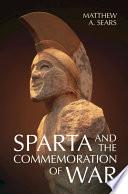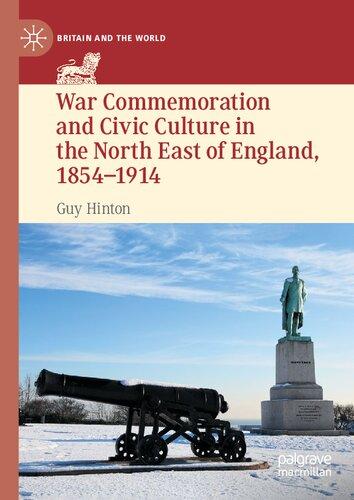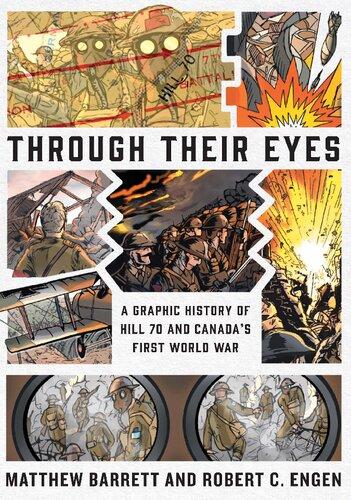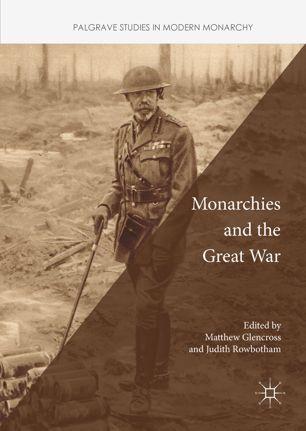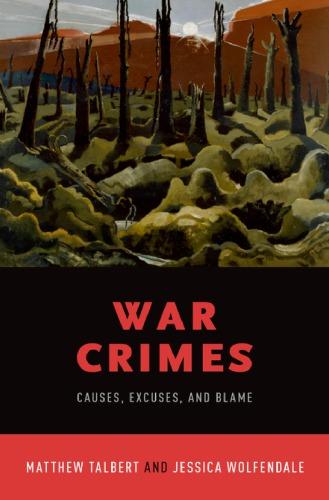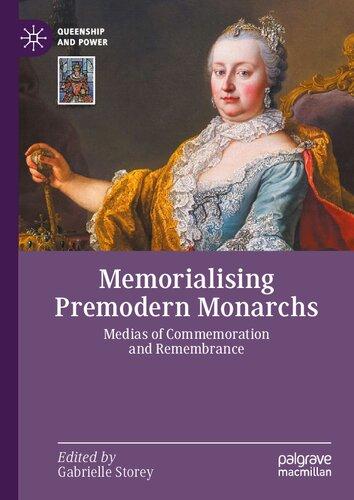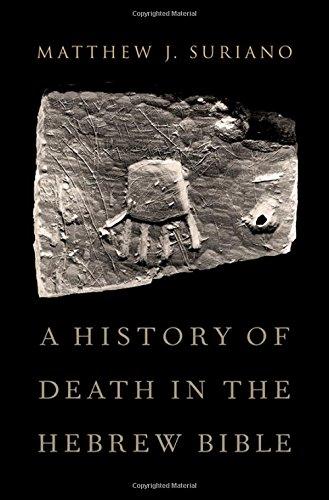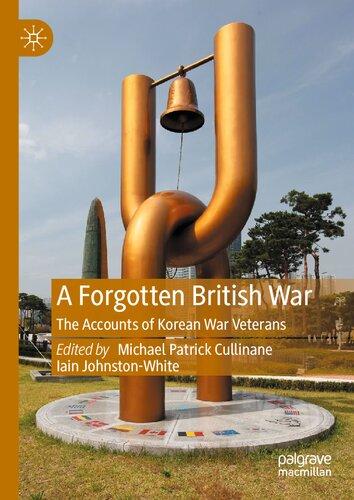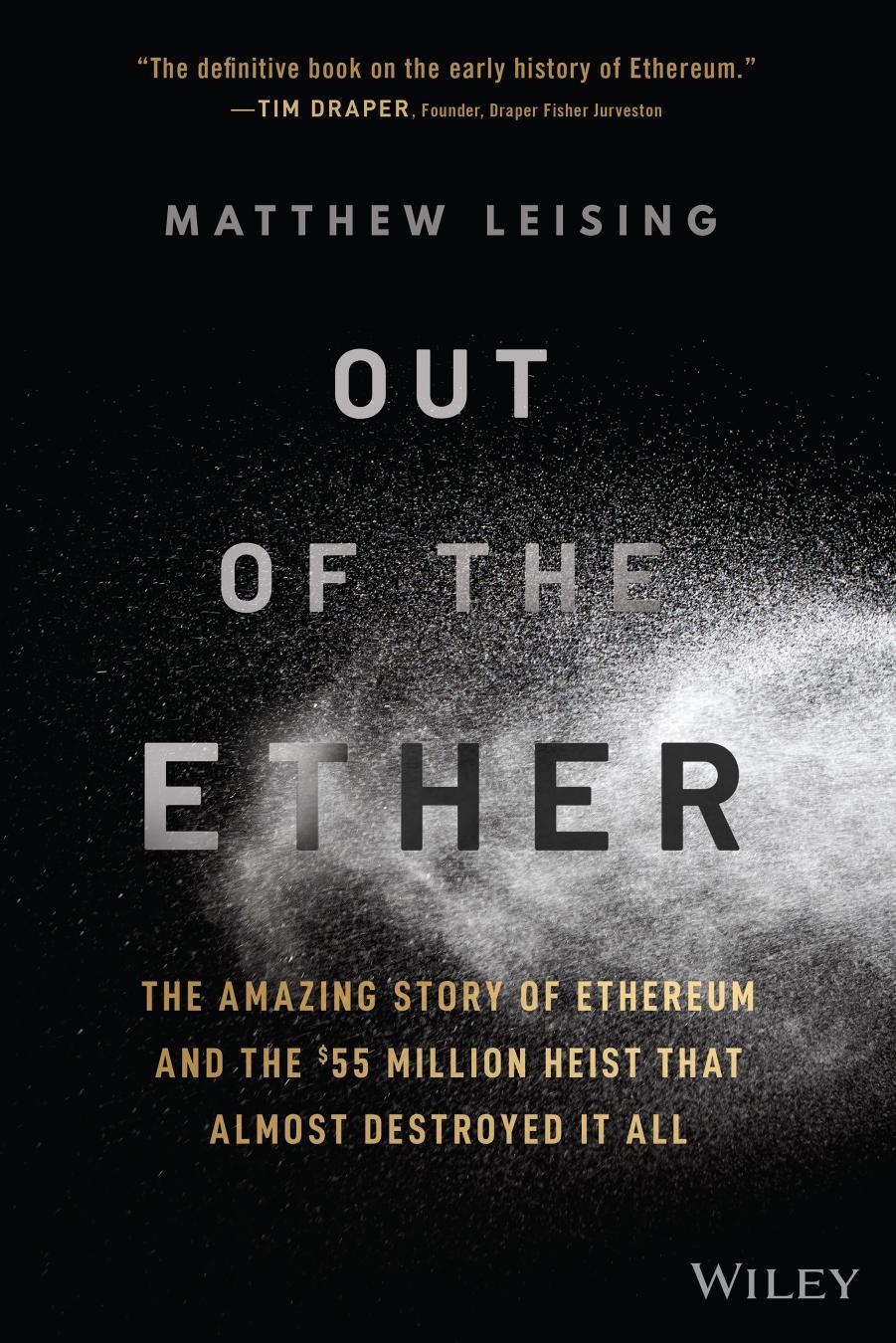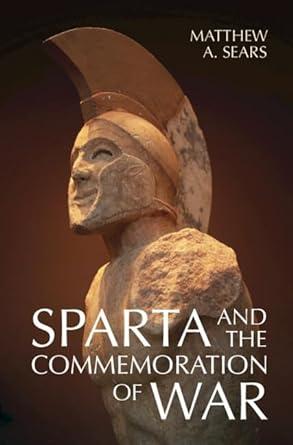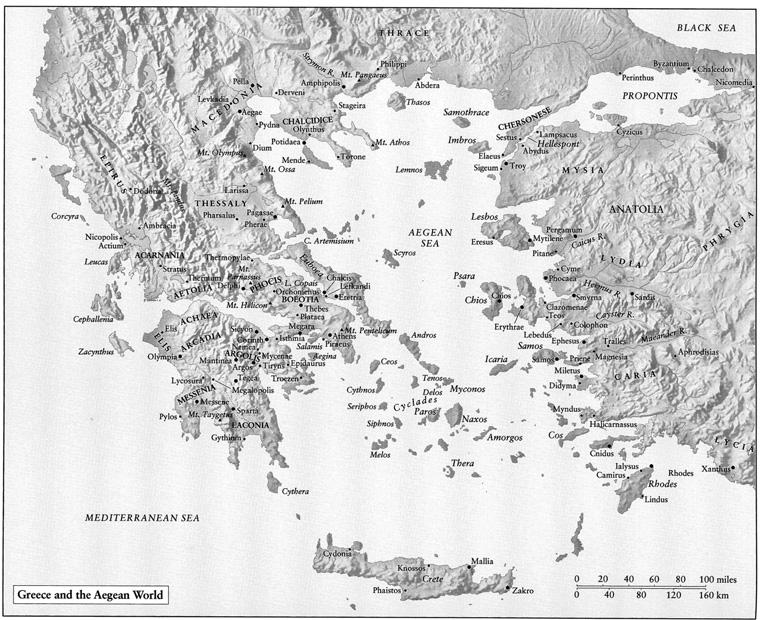Sparta and the Commemoration of War Matthew A. Sears Visit to download the full and correct content document: https://ebookmass.com/product/sparta-and-the-commemoration-of-war-matthew-a-se ars/
More products digital (pdf, epub, mobi) instant download maybe you interests ...
War Commemoration and Civic Culture in the North East of England, 1854–1914 1st Edition Hinton
https://ebookmass.com/product/war-commemoration-and-civicculture-in-the-north-east-of-england-1854-1914-1st-editionhinton/
Through Their Eyes: A Graphic History of Hill 70 and the First World War Matthew Barrett
https://ebookmass.com/product/through-their-eyes-a-graphichistory-of-hill-70-and-the-first-world-war-matthew-barrett/
Monarchies and the Great War 1st ed. Edition Matthew Glencross
https://ebookmass.com/product/monarchies-and-the-great-war-1sted-edition-matthew-glencross/
War Crimes: Causes, Excuses, And Blame Matthew Talbert
https://ebookmass.com/product/war-crimes-causes-excuses-andblame-matthew-talbert/
Memorialising Premodern Monarchs: Medias of Commemoration and Remembrance 1st Edition Gabrielle Storey
https://ebookmass.com/product/memorialising-premodern-monarchsmedias-of-commemoration-and-remembrance-1st-edition-gabriellestorey/
Física Universitaria 12th Edition Francis Sears
https://ebookmass.com/product/fisica-universitaria-12th-editionfrancis-sears/
A History of Death in the Hebrew Bible Matthew Suriano https://ebookmass.com/product/a-history-of-death-in-the-hebrewbible-matthew-suriano/
A Forgotten British War: The Accounts of Korean War Veterans Michael Patrick Cullinane
https://ebookmass.com/product/a-forgotten-british-war-theaccounts-of-korean-war-veterans-michael-patrick-cullinane/
Out of the Ether Matthew Leising https://ebookmass.com/product/out-of-the-ether-matthew-leising/
SPARTAANDTHECOMMEMORATIONOFWAR ThetoughSpartansoldierisoneofthemostenduringimagesfrom antiquity.YetSpartans,too,fellinbattle – sohowdidancientSparta memorializeitswarsandwardead?FromthepoetTyrtaeusinspiring soldierswithrousingverseinthe 7thcentury bce toinscriptions celebratingthe 300 ’slaststandatThermopylae,andfromSpartan imperialistsposingasliberatorsduringthePeloponnesianWartothe modernreceptionoftheSpartanasabravewarriordefendingthe “West,” Spartahashadanoutsizedroleinhowwarfareisframedand remembered.ThisimagehasalsobeendistortedbytheSpartans themselvesandtheirlaterinterpreters.Whiledebatescontinueto rageabouttheappropriatenessofmonumentstosupposedwarheroes inourcivicsquares,thisauthoritativeandengagingbooksuggests thathowtheSpartanscommemoratedtheirmilitarypast,andhow thisshapedtheirmilitaryfuture,hasperhapsneverbeenmore pertinent.
matthewa.sears isProfessorofClassicsattheUniversityofNew Brunswick.Heistheauthorof Athens,Thrace,andtheShapingof AthenianLeadership (CambridgeUniversityPress, 2013)andof UnderstandingGreekWarfare (2019).Heisalsothecoauthor(with C.JacobButera)of BattlesandBattlefieldsofAncientGreece:AGuide toTheirHistory,Topography,andArchaeology (2019).
SPARTAANDTHE COMMEMORATIONOFWAR MATTHEWA.SEARS UniversityofNewBrunswick
ShaftesburyRoad,Cambridge cb 28 ea ,UnitedKingdom OneLibertyPlaza, 20thFloor,NewYork, ny 10006 ,USA
477 WilliamstownRoad,PortMelbourne, vic 3207 ,Australia
314 – 321 , 3 rdFloor,Plot 3 ,SplendorForum,JasolaDistrictCentre, NewDelhi – 110025 ,India
103 PenangRoad,# 05 – 06 / 07 ,VisioncrestCommercial,Singapore 238467
CambridgeUniversityPressispartofCa mbridgeUniversityPress&Assessment, adepartmentoftheUniversityofCambridge.
WesharetheUniversity ’ smissiontocontributetosocietythroughthepursuitof education,learningandresearchatthehighestinternationallevelsofexcellence.
www.cambridge.org Informationonthistitle: www.cambridge.org/ 9781316519455
doi: 10 1017 / 9781009023726
©CambridgeUniversityPress&Assessment 2024
Thispublicationisincopyright.Subjecttostatutoryexceptionandtotheprovisions ofrelevantcollectivelicensingagreements,noreproductionofanypartmaytake placewithoutthewrittenpermissionofCambridgeUniversityPress&Assessment.
Firstpublished 2024
PrintedintheUnitedKingdombyCPIGroupLtd,CroydonCR 04 YY
AcataloguerecordforthispublicationisavailablefromtheBritishLibrary LibraryofCongressCataloging-in-PublicationData names :Sears,MatthewA.,author. title :Spartaandthecommemorationofwar/MatthewA.Sears. description :Cambridge;NewYork, ny :CambridgeUniversityPress, 2024.| Includesbibliographicalreferencesandindex.
identifiers : lccn 2023027770 | isbn 9781316519455 (hardback)| isbn 9781009010535 (paperback)| isbn 9781009023726 (ebook)
subjects : lcsh: Warandsociety – Greece – Sparta(Extinctcity)|War memorials – Greece – Sparta(Extinctcity)| Memorialization – Greece – Sparta(Extinctcity)|Collective memory – Greece – Sparta(Extinctcity)|Sparta(Extinct city) – Historiography.
classification : lccdf 261.s 8 s 6762024 | ddc 938/.9–dc23/eng/20230729
LCrecordavailableat https://lccn.loc.gov/2023027770 isbn 978 - 1 - 316 - 51945 - 5 Hardback
CambridgeUniversityPress&Assessmenthas noresponsibilityforthepersistenceor accuracyofURLsforexternalorthird-partyin ternetwebsitesreferredtointhispublication anddoesnotguaranteethatanycontentonsuchwebsitesis,orwillremain, accurateorappropriate.
ForCaraandKallie 1.1 TheMenelaionoutsideofSparta.Author’sphoto. page 28
1.2 The “SmilingHoplite,” ArchaeologicalMuseumofSparta. Author’sphoto.©HellenicMinistryofCultureandSports/ HellenicOrganizationofCulturalResourcesDevelopment. 29
1.3 The “RoundBuilding” ontheacropolisofSparta.Author’ s photo. 30
1.4 The “Leonidaion” or “TombofLeonidas” inSparta.Author’ s photo. 31
2.1 ArchaicLaconianbronzevotive,fromtheSamianHeraion, ArchaeologicalMuseumofVathy.Author’sphoto.© HellenicMinistryofCultureandSports/Hellenic OrganizationofCulturalResourcesDevelopment. 54
2.2 Bronzevotive,ArchaeologicalMuseumofSparta.Author’ s photo.©HellenicMinistryofCultureandSports/Hellenic OrganizationofCulturalResourcesDevelopment. 55
2.3 ArchaicLaconianivoryvotiveshowingPerseusbeheading Medusa,fromtheSamianHeraion,ArchaeologicalMuseum ofVathy.Author’sphoto.©HellenicMinistryofCultureand Sports/HellenicOrganizationofCulturalResources Development. 56
2 4 LeadvotivesfromthesanctuaryofArtemisOrthia, ArchaeologicalMuseumofSparta.Author’sphoto.© HellenicMinistryofCultureandSports/Hellenic OrganizationofCulturalResourcesDevelopment. 62
3.1 ThermopylaefromthehillockoftheThreeHundred’slast stand,lookingtowardsMountKallidromos.Inthe foregroundisamodernmonumentwithaninscriptionofthe famousSimonidesepigram.Author’sphoto.
viii
3.2 FragmentofanepigramsupposedlyhonoringMarathon. Athens,Agoraobjectno.I 4256;imageno. 2012.83.0052 (96–79–20).EphorateofAntiquitiesofAthensCity,Ancient Agora,ASCSA:AgoraExcavations.©HellenicMinistryof CultureandSports/HellenicOrganizationofCultural ResourcesDevelopment(H.O.C.RE.D.).
4.1 ThenortherntipofSphacteriaasviewedfromancientPylos. PhotobyC.JacobButera.
4.2 TheNikeofPaionios,ArchaeologicalMuseumofOlympia. Author’sphoto.©HellenicMinistryofCultureandSports/ HellenicOrganizationofCulturalResourcesDevelopment.
4.3 Theossuaryandgoldcrownfromthe “TombofBrasidas,” ArchaeologicalMuseumofAmphipolis.Author’sphoto.© HellenicMinistryofCultureandSports/Hellenic OrganizationofCulturalResourcesDevelopment.
4.4 TheTreasuryoftheAtheniansatDelphi.Author’sphoto.
5.1 TheSpartanAdmirals’ MonumentatDelphi(ontheleft). Onlythestatuebasessurvive.ThebasesoftheAthenian Marathonmonument(ontheright)areontheothersideof theSacredWay.Author’sphoto.
5.2 TheTomboftheLacedaemoniansintheAthenian Kerameikos(theAcropoliscanbeseeninthebackground). Author’sphoto.
5.3 PartofthesurvivinginscriptionontheTombofthe Lacedaemonians,showingthenameofThibrakosandhistitle of polemarch inretrogradelettering.Author’sphoto.
6.1 LionfunerarymonumentattheArchaeologicalMuseumof Thebes.Author’sphoto.PermissioncourtesyoftheEphorate ofAntiquitiesofBoeotia.©HellenicMinistryofCultureand Sports/HellenicOrganizationofCulturalResources Development(H.O.C.RE.D.).
6.2 LionfunerarymonumentsattheArchaeologicalMuseumof Sparta.Author’sphoto.©HellenicMinistryofCultureand Sports/HellenicOrganizationofCulturalResources Development.
6.3 TheBoeotianvictorymonumentatLeuctra.Photoby C.JacobButera.
7.1 Jacques-LouisDavid, LeonidasatThermopylae (1814).Paris, Louvre 3690.©RMN-GrandPalais/ArtResource,NY.
7.2 StatueofUSPresidentHarryTrumaninAthens(splashed withredpaintafteranapparentactofrecentanti-American protest).PhotobyLeeBrice.
7.3 ModernLeonidasmonumentatThermopylae,withthe inscription “molōnlabe ” Author’sphoto.
7.4 TheRomantheatreofSpartabeneaththeacropolis,withthe moderntowninthemiddledistanceandMountTaygetusin thebackground.Author’sphoto.
7.5 ModernmonumentinthecentralsquareofSparta,with aparaphrasefromTyrtaeusinscribedonit.Author’sphoto.
7.6 MonumentinSpartatoLaconianOlympicvictorsfrom 776 bce tothepresentday.Author’sphoto.
E.1 TheCanadianNationalVimyMemorialinFrance,showing figuresrepresentingCanadaBereft,theSpiritofSacrifice,and thePassingoftheTorch.Author’sphoto.
1 GreeceandtheAegean,fromS.Pomeroy,S.M.Burstein, W.Donlan,J.T.Roberts,D.Tandy. 2012, AncientGreece: APolitical,Cultural,andSocialHistory (3rdedition),Oxford, insidefrontcover.©OxfordUniversityPress.Reproduced withpermissionoftheLicensorthroughPLSclear. page xx
2 Sparta,topographyandmajorlandmarks,fromSanders 2009. ReproducedbypermissionoftheBritishSchoolatAthens.
Acknowledgements Ihavethepleasureofthankingmanyinstitutions,colleagues,andfriends whohavehelpedoverthecourseofthisproject.TheSocialSciencesand HumanitiesResearchCouncilofCanadagenerouslyfundedthisresearch throughanInsightGrant.TheUniversityofNewBrunswick(UNB)has supportedtheworkthroughoutbyprovidingresearchfunding,sabbatical leavein 2019,andacongenialenvironmentinwhichtoteachandwrite. IhavebenefittedfromworkingwithmanycolleaguesintheDepartments ofHistoryandClassicsandAncientHistory,particularlyCindyBrown, CarolynMacDonald,JamesMurray,LisaTodd,GaryWaite,andLee Windsor.SusanParkerandSpencerPaddock,twoofUNB’sstellargraduatestudents,helpedmesortoutinnumerableissuespertainingtocommemorationandcombatmotivation.TheAmericanSchoolofClassical StudiesatAthens,forwhichIdirectedthe 2019 SummerSession,isthe idealacademichomeinGreece.TheSummerSessionstudentschallenged meonahostofquestionsandprovidedkeeninsightsinthe field.In Greece,LeeBrice,GlennBugh,MariaListon,AndyStewart,andGeorgia Tsouvalaarealwayswonderfulconversationpartnersonallthingsrelated tothecountry.JackDavis,GuySanders,andSharonStockersparkedmy deepinterestinSpartaandthePeloponnesewhentheydirectedschool tripstotheregionwhileIwasagraduatestudentfellow.
C.JacobButeraandAlanSearsreadtheentiredraftmanuscriptcarefully andconscientiously.Thisbookwouldhavebeenmuchpoorerwithout theirhelp.Manyothersengagedwithmyideastoofferaid,correction,and unpublishedoryet-to-be-publishedmaterial.IthankNathanArrington, DavidBedford,PaulCartledge,TimCook,JosephDay,JohnDenault, StephenHodkinson,SimonOswald,JessicaRomney,AlanSheppard, BarryStrauss,JonathanVance,ThomWorkman,andJoanneWright.
Iamgratefultotheaudiencesthatheardandcommentedonpartsofthis researchasitwasdeveloping,includingtheSocietyforClassicalStudies, theArchaeologicalInstituteofAmerica,theAtlanticClassicalAssociation,
theCanadianMilitaryHistoryColloquium,theHellenicSociety’ s Thermopylae 2500 Conference,MemorialUniversityofNewfoundland, HollinsUniversity,theUniversityofChicago,andtheUniversityof Winnipeg.TheClassicalAssociationofCanadahostedmeasits 2022 lecturerforOntarioandQuébec,whichaffordedamatchlessopportunity tospeakwithfellowclassicistsatmorethanadozeninstitutionsasIputthe finishingtouchesonthebook.
Goodeditorsareaboonforanywriter.AdrianLeeatthe GlobeandMail hassupportedmeforseveralyears,helpingtorendermythoughtsabout SpartaandGreecepalatabletoawiderpublic.AtCambridgeUniversity Press,ithasbeenadelighttoworkwithMichaelSharp,whoseimportance fortheworldofclassicalscholarshipcannotbeoverstated.Themembersof theproductionandeditorialteam,includingAdamBell,KatieIdle, BethanyJohnson,andBhavaniVijayamani,wereapleasuretowork with.Theanonymousreadersforthepressrescuedmefromfactualerrors, scholarlyinfelicities,andstylisticquirks.WhileIaloneamresponsiblefor thisbook’sarguments,thesereadershavemadethebookfarbetter.
Mywife,Jenny,andourchildren,CaraandKallie,makemyhome ablessedplace.Theyalso,withmostlygoodhumor,accompaniedmeto SpartaandonatoolongitineraryofGreeksitesimportantforSpartan history.Icouldonlycompensatethemwithgyrosandtheoccasional beach.Theycompensatedmebymakingtheresearchprocessfarmore delightfulthanitshouldhavebeen.
Prologue BrasidasatAmphipolis Thucydides,thehard-nosedrealistwhowrotethehistoryofthe PeloponnesianWar,wasnotoneforfancifultales.Otherwriters coulddazzletheiraudienceswithstories “ reekingofmyth, ” while Thucydideswouldprovideallfutur egenerationswithauseful,ifdry, accountingofhumannatureandwhystatesactthewaytheydo. Despitethisreproachaimedathisfellowhistorians – including,perhaps,Herodotus,the “ FatherofHistory ” himself – Thucydideswasnot immunetothecharmsofreal-lifeheroes.Themostobviousherofor ThucydideswasPericles,thevisio narypoliticianandgeneralwholed AthensintowarwithSpartaandwhodeliveredoneofthemost importantandmemorablespeeches oftheClassicalGreekworld,the FuneralOration.ButitwasaSpartan,asoldiernamedBrasidas,who bothbeatThucydidesinthemilitaryarenaandevokedforthehistorian thedashing fi gureofawarriorfromHomer ’ s Iliad fi ghtingonthe plainsofTroyduringalong-lostHeroicAge.
AsbefittingaherointheHomericmold,Brasidasdiedinbattle.Agreat tactician,strategist,anddiplomat,BrasidashadtakenthePeloponnesian WartoAthens’ subjectstatesinthenorthAegean,onwhichAthens dependedforitsgiganticnavy’srawmaterials.Thejewelinthecrownof Athens’ northerncitieswasAmphipolis,defensivelylocatedonabendin theStrymonRiver,afewkilometersfromthesea.In 424 bce ,Brasidas marchedthroughnorthernGreeceintheguiseofaliberatoragainst Atheniantyranny(if,perhaps,threateningacityortwowith “forced freedom” shouldtheyrefusetoembracehisofferofliberation),and managedtowrestmanycitiesfromAtheniancontrol,including Amphipolis.TaskedwithdefendingAmphipoliswasnoneotherthan Thucydides,buthewasawayontheislandofThasosandonlymanaged toarriveafterthecityhadbeentaken,earninghimselfexilefromAthens andthusplentyoftimetowritehis History.ThelossofAmphipolishit
Athenshard(theywouldtrytoretakethecity,unsuccessfully,formuchof thenextseveraldecades),andBrasidashaddemonstratedhimselftobe Athens’ mostdangerousenemy.Athenssentanarmyin 422 toretakethe city,butBrasidas,aftergivingarousingspeechtohismen,stormedoutof thecitygatesinaboldsurpriseattackagainsthismorenumerousfoe. Perplexedbythesuddenattack,theAthenianforcewasbrokenintwo,and thosewhoavoidedbeingkilledorwoundedranfortheirshipsonthecoast. TheAtheniancommander,thewarmongeringdemagogueCleon,was killedintheaction.So,too,wasBrasidas,dashingintothefraytoback uphisinspiringwordswithaction.
SuchbravadowastypicalfortherenownedSpartansoldier.Afewyears earlier,in 425,Brasidasfaintedfromhiswoundsashestoodonthedeckof awarshiptourgehisrowerstoramtheirvesselagainsttherockyshoreof Pylos.OnthatshorewereAtheniansdefendingthenewbasetheywere buildinginSpartanterritory,andBrasidassawthatheneededtotakeany andeverymeasuretopreventtheAtheniansfromsucceeding.Whilemost oftheSpartanslosttheirnerveagainsttheAtheniansatPylos,especially oncetheAthenians’ superiorshipsenteredthebattle,Brasidaskeptupthe fightatgreatpersonalrisk,iftonoavailintheend.Inhisshortmilitary career,BrasidasstoodoutmorethananyotherSpartan,beingthe firstin thePeloponnesianWartoreceiveofficialcommendationatSpartafor valorinthe fieldwhenonanotheroccasionhefendedoffasurprise amphibiousattack.
ThehonorsBrasidasreceivedafterhisdeathsurpassedallthosehehad enjoyedinlife.ThepeopleofAmphipolisdeclaredBrasidastheirnew founderandtoredownallthebuildingsassociatedwiththeiractual founder,anAtheniannamedHagnon.Evenmoreostentatiously,the AmphipolitansburiedBrasidasintheheartofthecity,rightnexttothe agora – anextraordinaryhonor,sinceGreekburialswerealmostalways outsideofthecitywalls.ThepeopleofAmphipolisalsoinstitutedannual gamesinhishonor,notunlikethosegamesAchillesheldforhisslain companion,Patroclus,inthe Iliad .AnothercityBrasidashadliberated nearAmphipolis,Acanthus,erectedatreasurybuilding – asortofmini templeholdingdedicationsandothervaluables – inhishonoratthe PanhellenicshrineofDelphi,makingBrasidasthe fi rstmortalmantobe namedonsuchabuildingsincetheageofArchaictyrantscenturies earlier.Finally,inSpartaitselfBrasidaswasgivenalargecenotaph, standingoutamongthecity’ smonumentsevenhundredsofyearslater, andnotfarfromthetombofLeonidas,theheroofThermopylae.From oneendofGreecetotheother,SpartansandotherGreekscouldsee
physicalmonumentscommemoratingBrasidas ’ excellence,his aretē .And thankstoThucydides,thisSpartan’sexamplebecameaThucydidean “ possessionforalltime.”
ManyreadersofThucydideshaveseeninBrasidasamostatypical Spartan.WheretheSpartanswereslowtoactionandstuckintheirways, Brasidaswasboldandinnovative.Afterall,hetookthewartoAthens’ northernterritorieswhentherestofSpartaseemedcontenttofollowthe sameoldstrategyofinvadingAtticayearafteryear;andheriskedhislife todislodgetheAtheniansfromPyloswhentherestoftheSpartanswere struckwitless.Brasidas,however,w asfarmorerepresentativeofSpartan militaryleadersthan fi rstmeetstheeye.OverthecourseofSpartan history,charismaticandambitiou swarriorswhosoughtgloryandfame oftenledSparta ’sarmies.Whilemanyofthese fi guresmighthaveaimed atgreaterrecognitionthantheSpart anauthoritieswerepreparedtogive, theyweredoingnothingotherthantheirHomericexemplarshaddone, andSparta,withitsemphasisonandostentatiouscommemorationof militaryprowess,implicitlyencouragedthemtodo.HowcouldaSpartan doanythingbutseekoutbattleandopportunitiestoberememberedafter death?Hehadbeenraisedfromayoungagetotoleratetheharsh conditionsofmilitarylife,walkedregularlypasttheinscribednamesof theThreeHundredwhofoughttothedeathatThermopylae,andsawthe cruelpublichumiliationoftheloneSpartanwhoreturnedhomealive afterdefeat.After 440 ,whenBrasidashadcomeofage,hewouldhave witnessedtheconstructionoftheTombofLeonidas,ashrinebuiltforthe repatriatedremainsofthedeadking.Inshort,Sparta ’semphasison militarytrainingandtheheroicdeadrefl ecteditsmilitaristicheritage whilealsoperpetuatingit.Brasidas wasmerelyamongthemostsuccessful ofSpartansdoingexactlywhattheircountryexpectedthemtodo. Militarismbreedsmilitarism.
TheSpartansandotherGreeksfoughtformanyreasons,butone concernloomedoverallothers:toberemembered.Homer’sAchilles famouslychoseashortbutgloriouslifeoveralongbutobscureone.The historianHerodotuswrotethehistoryofthewarsbetweenGreeceand Persialargelytopreserveandgiveglorytogreatdeedsandmarvelousthings donebyGreeksandnon-Greeksalike.Soldiersgavetheirlivesandtookthe livesofothersinordertoberememberedbytheirfamiliesandcommunitiesforalongtimetocome.Soldierswhowereremembered – inthestories oftheircommunity,inliterature,inscribedonstone,orburiedbeneath agleamingmonument – inspiredfuturesoldierstoaimforeverlasting memorytoo,and fightallthemoreeagerlyandvalorouslyonthe
battlefield.Brasdias’ heroiclifeandheroicdeath,ascommemoratedby Greece’sforemosthistorian,acenotaphatSpartaandanotherontheslopes ofDelphi,andaprominenttombandannualgamesatAmphipolis, providedhisfellowSpartanswithashiningexampleofwhatwaspossible forthosewhofoughtanddiedwell.Brasidasinspiredothergeneralsto striveforunsurpassedglory.Hecertainlyalsoservedasamodelfor ordinarysoldiersandcitizens.
Thisbookwillexplorehow figureslikeBrasidas,andtheircommemoration,reflectedandshapedattitudestowardswarinancientGreece, especiallyinSparta.Assupposedlyoneofthemostmilitaristicsocieties inworldhistory,theSpartansreliedonthegloryandmemoryattachedto warfareinordertoperpetuatetheirwayoflifeandachievecontinued militarysuccess.Withoutunderstandingthemotivesofsoldiersgoingto war,andthewaysocietycraftedandexploitedthosemotivestokeep soldiersgoingtowar,wecannotunderstandSpartaanditsroleinGreek history.AndinlightofThucydides’ famousideathat “thehumanthing” tendstoremainthesameacrosstimeandspace,Spartanmilitarismcan helpusunderstandourownworldalittlebetter,especiallygiventhe increasingpopularityofSpartaandSpartanimageryinmanyoftoday’ s politicalandactivistmovements.Thus,understandinghowSpartanmilitarismworked,particularlyinlightofhowSpartacommemoratedand remembereditswardead,isatopicthatisnotonlyinterestingbuttimely andimportant.Ifwarandviolencearethingswereallyseektoavoid,we besttakealookatancientGreece’smoststereotypicallywarlikeandviolent society,andhowitgotandstayedthatway.
AsidefromtheliterarymonumentstofallenSpartans,includingthe workofThucydidesandotherhistoriansandthepoetryofTyrtaeusand Simonides,wewillexplorehowthephysicalspacesofancientSpartawere steepedinmemoriesofthewardead.TheRoman-eratravelwriter PausaniastellsaboutthemanymonumentsscatteredaroundtheSpartan landscapethatglorifiedwarandthewardead,includingnotonlytombsto famousfallenleaderslikeBrasidasandLeonidasbutalsoanelaboratestoa supposedlyadornedwithspoilsfromXerxes’ Persianarmy.Archaeologists havespentthelastcenturytryingtosortoutexactlywhatwentwhereinthe ancientSpartancity,butthereisstillalotwecanlearnbyexamining Sparta’stopographyandmonuments,nestledundertheforbidding Taygetusmountainrange.Sparta’sarchaeologicalmuseumandother museumsthroughoutGreececontainmanyfunerary,honorary,andvotive piecesthatilluminateSpartanmilitarism.Thesepiecesontheirowncan tellusagreatdeal,buttheyalsowereoncesetupinrealphysicalspaces.
Forinstance,thefamous “smilinghoplite,” whomanyhavebelievedtobe Leonidashimself,wasfoundbythesanctuaryofAthenaChalkioikos, “of theBronzeHouse,” ontheSpartanacropolis.Thiswastheveryspotwhere anotherSpartangeneralofthePersianWars,theex-regentPausanias,was starvedtodeathafterfallingoutoffavorwiththeSpartantopbrass, allegedlybecausehewastooeagertoglorifyhimselfinsteadofallthe GreeksforthevictoryatPlataeain 479,butmorelikelybecausehetriedto takeSpartanarmiestoofarfromSpartaandfortoolong.Spartanssetup monumentsinotherplacestoo,fromthefabledpassatThermopylae,to thesanctuaryofHeraontheislandofSamos,allofwhichcanhelpus understandSpartanmilitarismmorefully.
WhenwelookatSpartancommemorationandhowitchangedover time,wediscoversomesurprisingthings.DespitetheSpartans’ fearsome reputation,theyfoughtremarkablyfewwars;andwhentheydid fight,they werenotnearlyasinvincibleastheirancientandmodernreputation suggests.Forsometimenow,historianshavebeenpokingholesinthe mythofSpartaninvincibility.Whatnoonehasnoticeduntilnowisthat Spartanmilitarismwaskeptincheckbytheverydesireforfameandglory thatanimatedsoldiersinbattle.Theintuitivepresumptionaboutasociety obsessedwithmilitarygloryisthatitsmembersmust fightatevery opportunity.LateArchaicandClassicalSparta,though,seemstohave foughtfewwarspreciselybecausegloryandfamewereitsonlyoverriding concerns.Otherreasonsforgoingtowar,suchasdefendingtheGreeks fromforeigninvadersorfreeingtheoppressed,reasonswemight findmore palatabletoday,werenotcompellingmotivationsfortheSpartans,which keptthemoutofmanymilitaryconflicts.OtherGreeks,mostnotablythe Athenians,embracedtherhetoricofliberation,of “Greek” versus “barbarian,” andthusfoughtmoreoften,furtherfromhome,andforlonger periods.WhentheSpartanseventuallyembracedthesereasonsthemselves, whichtheirchangingcommemorativepracticesreflect,theyfought,killed, anddiedmoreoften,withdisastrousconsequencesforSpartanpower. Commemorationprovidesinsightintothereasonswhysocieties fight,and thosereasonshaveabearingonthelikelihoodofsocietiesembracingwaras agoodoption.
Whilethe “ monumentwars ” rageconcerningtheplaceofConfederate statuesandothercontroversialpiecesincontemporaryAmerica,andthe purposeofcommemorativesitesandritualscomesintoquestioninmany othercountriestoo,itisnowtimetotakeanewlookattheSpartan commemorationofwar,itsliteraryaccounts,materialmonuments,and topographicalspaces.Spartaisnotonlyrelevantbecauseitwasseemingly
moremilitaristicthanotherGreekstateswere.Spartanimageryand Spartanexamplesfrequentlyhaveacentralplaceintheactivismofvarious pro-warandanti-immigrantgroupsinNorthAmericaandEurope.From atleastthe 18thcentury,Spartahasservedasamodelforarangeof movements,fromthepoliticalphilosophyofRousseautothelobbying oftheNationalRifleAssociation.Letusthereforeconsidermilitary figures likeBrasidas,themodeltheysetfortheirfellowSpartans,andhowthatcan informourownideasabouthowonegenerationofwarriorspassesthe torchontothenext,eventoday.
Map 1 GreeceandtheAegean,fromS.Pomeroy,S.M.Burstein,W.Donlan, J.T.Roberts,D.Tandy. 2012, AncientGreece:APolitical,Cultural,andSocial History (3rdedition),Oxford,insidefrontcover.©OxfordUniversityPress. ReproducedwithpermissionoftheLicensorthroughPLSclear.
MemoryandMirage Introduction:WhySparta?WhyNow?
Spartaneedsnointroduction,letaloneajustificationforwhyitisworth studying.AsancientRomansvisitedSpartacenturiesafteritsheydayand weretreatedtoanexaggeratedthemeparkofsortsofwhatClassicalSparta wasreallylike,so,too,doesmuchofthemodernworldretainafascination forthesestrangeGreeks – fromEnlightenmentpoliticaltheorists,to modernGreeknationalists fightingforindependencefromthe Ottomans,andtopopularculturetoday.AncientSpartagrabsourimaginationbecauseitwasso weird,eventoitsfellowGreeks.Phalanxesofsocial equals fightingwithpeerlessskillandbraveryeveninthefaceofcertain deathisboundtocompel,andisanimagedrawnfromcarefullycrafted propaganda,apublicrelationscampaigninitiatedbytheSpartansthemselves.IamnotpreparedtogoasfarasMykeCole,who,inhisrecentbook, TheBronzeLie,arguesthatSparta’smilitaryprowessandinvincibilitywere entirelyfabricatedbytheSpartansandrepeatedbycreduloussources.1 Ido agree,however,thatweneedtoexaminethisancientsocietyanditsimage withacriticaleye.Evenoncewehavedoneso,Ibelievewecanstill understandtheSpartansasdifferent,asoutliers.Militarycommemoration isonesubjectinwhichthisdifferenceisstarkest.
Spartais,nexttoAthens,thesecond-moststudiedClassicalGreekpolis.It isadistantsecond,though,sinceAthenshasleftanoverwhelmingprofusion ofevidencebycomparison – literary,architectural,artistic,archaeological, andepigraphical.SinceatleastthetimeofthePericleanFuneralOrationin Thucydides’ HistoryofthePeloponnesianWar,Atheniancommemoration hasbeenbetterunderstoodandtheinspirationformoreworksofscholarship thananyotherGreeksociety.Brilliantrecentstudies,suchasNathan Arrington ’ s Ashes,Images,andMemories:ThePresenceoftheWarDeadin
Fifth-CenturyAthens ,continuetooffernewinsightsintoandinterpretationsofAtheniancommemoration,andtherelationshipbetweensoldiers,theirfamilies,andthestateforwhichtheyfoughtanddied. 2 ScholarssuchasPollyLowhavebeguntotakethesescholarly approachestopartsofGreecebeyon dAthens,includingSparta,but alotmoreworkneedstobedone. 3 UntanglingSparta ’ scommemorative pastisadifferentbusinessthandoingsoforAthens,butthereissome interestingevidencetoworkwithandwecanmakeuseofsomeilluminatingcomparisons.
Thisisamomentinhistoryatwhichmemory,monuments,and commemorationhaveneverbeenmoreimportantandmorecontroversial. Howwethinkaboutthepastisinthenewseveryday,fromthe fightto removeConfederatemonumentsintheUnitedStatestotheideological battleswagedoverthehistoryandethnicitybehindclaimstoeastern UkrainewhileRussiacontinuesitsassaultonthatcountryasIwrite thesewords.Modernmilitarycommemorationtendstostraddlethe awkwarddividebetweencelebratingheroisminordertoinspirepatriotic serviceinfuturegenerationsandrevealingthehorrorsofwarinorderto discouragepeoplesandstatesfromtakinguparms.Iwanttoinvestigate howoneofhistory’smostsupposedlymilitaristicsocietiescommemorated war,andthelinksthatcommemorationhadtowhetherandhowoftenthat societywenttowar.Intheprocess,wewilllearnmoreabouttheSpartans andtheancientGreeks,butwewillalsohaveoccasiontothinkaboutour ownformsofcommemorationandourownrelationshipwitharmed conflict.Thecommemorationofwar,ancientandmodern,bothreflects andformsasociety’sattitudestowardswar.InthecaseofSparta,that particularancientsocietyhasoftenbeenbroughttobeartocommenton warstoday.
Inwhatfollowswewillconsidersomeideasaboutcommemoration, remembrance,andcollectivememory,andhowtheseideascanbeused fruitfullyinastudyofancientSparta.Wewillnexttakealookatthe “SpartanMirage,” namelythesourceswehaveforSpartansocietyandthe uniquechallengesthosesourcespresent.Thisintroductorychapterwill concludewithsomebasicprinciplesofSparta’scommemorationofwar, particularlyhowtheyrelatetotheideasoftheirfellowGreeks.These principleswillbeexploredindepthandcomplicatedbythechaptersthat follow.WewillalsotakeatourthroughClassicalSpartaandpauseto
2 Arrington 2015.ForAthens,seealso Low 2010; Kucewicz 2021b; Pritchard 2022
3 See,forexample, Low 2003; 2006; 2011; Kucewicz 2021a
considerthetopographyandmonumentsanancientSpartanwouldhave encountered,andwhatthosemonumentsmighthavemeanttothe observer.
ANoteonTerminology Beforemovingon,ImustclarifysomeofthemostimportanttermsIwill usethroughoutthisstudy,sincejustwhattheterms “Sparta” and “the Spartans” meanismorecomplicatedthaninthecaseofotherGreek peoples.First,Spartawasastrangepolisinthatitwasunwalledandwas moreanamalgamationofvillagesthanacentralurbancoresurroundedby ruralhinterlandasotherpoleis(thepluralfor “polis”)were.Spartawas locatedinthesouthernPeloponneseinaregionlatercalledLaconia, separatedfromMesseniatothewestbytheformidableTaygetusmountain range.TheSpartanstatewastechnicallycalledLacedaemoninantiquity, anditsfreeresidentstheLacedaemonians.Thistermwasthesourceofthe famouslambda,orinverted “V,” eventuallyemblazonedonSpartanhopliteshields.Sometimes,therefore,thetermsLacedaemonianandSpartan areusedinterchangeablyinthesources,andinthisbook.
ClassicalSpartansocietywasstratifiedintothreemaintiers.Atthetop, representingaminorityofthepopulation,werethefullcitizens,the Spartiates,sometimescalledthe homoioi,or “similars.” Thesewerethe Spartanmenwhotrainedcontinuouslyforwarandwholivedasifon campaign,diningtogethereverydayincommonmesses,evenwhileat homeandatpeace.TheSpartiateswereeligibletoserveinimportant offices,suchastheoversightbodyof fiveannuallyelectedephors,andinan assemblythatratifiedlawsandotherstateactionsandpolicies.The participationoftheseSpartiatesingovernmentmeanswecanunderstand Spartaasanoligarchy,rulebythefew,eventhoughSpartaalsohadtwo kings,sowasatthesametimeatypeofmonarchyordiarchy.
ThefemalefamilymembersoftheSpartiateshadmoreprivilegesand freedomthantheircounterpartsinplaceslikeAthens,astateexceptionally restrictivetowomen,but,evenso,womenplayednoformalroleinSpartan governmentoronmilitarycampaign.Spartanwomenandgirls,however, hadanimportantplaceinSparta’smilitarycultureanditscommemorative practices.Girls,forexample,couldexerciseinpublicjustlikeboys,and,as partofacompulsorypublictraining,wereexpectedtoobserveandmock theboysinordertospurSpartanmalestogreatermartialexcellence. Alargepercentageofthefamousaphorisms,orsayings,attributedtothe SpartansbyPlutarchandotherauthorscomefromwomen,andmanyof
theseaphorismsarestatementsofSpartanattitudestowardswarand memory.AftertheSpartanslostattheBattleofLeuctrain 371 bce , Spartanwomenwholosthusbandsandsonswalkedaroundthecitywith joyfulexpressions,happythattheirmalefamilymembershaddiedgloriouslyratherthansurvivedshamefullyaftersurrendering.Spartanwomen, atleastasportrayedbyGreekmaleauthors,wereimportantforSpartan commemoration.4
Freenon-citizenswholivedinSpartanterritorywerecalledthe perioikoi, or “dwellers-around.” The perioikoi typicallylivedintheirownvillagesin Laconia.TheyoutnumberedthefullSpartiates,probablybyasignificant margin.TheywererequiredtoserveintheSpartanarmyandtookcareof manyofthestate’snecessaryeconomictaskswhiletheSpartiatestrained forwar.ThetermLacedaemonianusuallyreferstoboththeSpartiatesand the perioikoi.Theancientsourcestendtospecifywhentheymeanonly Spartiatesinsteadofbothgroupstogether.5
Atthebottomtierwerethehelots,unfreelaborerswho(themen,at least)mainlyworkedtheagriculturallandcontrolledbySparta.Wemight bestunderstandthehelotsasserfs,orperhapspersonsenslavedbythestate ratherthanownedaschattelbyindividualSpartiatesandtheirfamilies(as wasthecasewithslaveryinotherGreekpoleis,suchasAthens).6 Some helotscamefromLaconia,whileotherswerefromneighboringMesseniato thewest,whichSpartaconqueredintheArchaicperiod.Thehelotswere thebackboneofSpartanpower,providingalltheproduceandother essentialsforthesurvivalofthestate.Manyancientsourcesclaimthat aneedtocontrolthehelots,andthefearofhelotrebellion,drovemuchof Sparta’spolicyandwayoflife.7
Thisbookdealsprimarilywithwhatwemightcallthe “official” commemorationofwarinSparta – poemsrecitedatreligiousfestivalsand remembranceceremonies,monumentserectedinpublicspaces,
4 See Millender 2018 forageneraltreatmentofSpartanwomen,withfurtherbibliography.Seealsothe foundationalmonographonthetopicby Pomeroy 2002.ForadiscussiononSpartanwomenand war,see Powell 2004.
5 Forthe perioikoi,see Ducat 2018.Fornon-SpartansintheSpartanarmy,seetherecentarticleby Pavlides 2020.
6 Athenshadpubliclyenslavedpersonstoo.AmaindifferenceseemstobethatSpartiatesdidnotown privatelyenslavedpersons,whereasAthenshadbothcategoriesofslavery.
7 Thebestresourceonthehelotsistheeditedcollectionof LuraghiandAlcock 2003 Luraghi 2008 discussestheMesseniansinparticular.Foranup-to-datediscussionofthestateofhelotscholarship, andacomparisonofhelotagewithotherslavesystemsinantiquity,seenow Lewis 2018: 125–146.For ageneraloverviewofthepoliticalandsocialstructureofSpartaascomparedtoAthens,with suggestionsforfurtherreadingandsources,see Sears 2022.Seealso Humble 2022,inthesame volume,foracloserlookatSparta.
inscriptionscommissionedby “theSpartans” asastate,andsoon.While Iwillrefertosomeindividualmonuments,dedications,andperspectives,for themajorityofthisstudywewillbeconsideringwhat “theSpartans” didto remembertheirwarsandtheirwardead.ThesourcesforSpartaarelackingas itis,anditisaccordinglymuchmoredifficulttoassesstheideasandpractices ofindividualSpartiates,nottomentionwomen, perioikoi,orhelots.These non-elites,ormarginalizedpopulations,hadagencyoftheirown(ifwithin theconfinesofvarioussystemsofoppression),whichwouldhavehad abearingoncommemoration.Wemustkeepthatfactinmindevenas thosenon-Spartiateandnon-“official” perspectivesgetlostintheshuffle.In additiontothestudiespointedoutinnotes 4–5,Iforoneeagerlyawaitfurther workonmarginalizedpeoplesinLacedaemon,includinginthesphereofwar.
ThisbookdealsprimarilywiththeArchaicperiod,datingfromroughly 700 bce (orwhenevertheHomericepicswere firstcomposed,perhaps fiftyorsoyearsearlier)to 479 bce ,whenXerxes’ Persianinvasionwas repelledfrommainlandGreece;andtheClassicalperiod,whichrunsfrom 479 to 323 bce ,theyearAlexandertheGreatdied.TheHellenisticperiod (323–30 bce )followstheClassical,fromwhichseveralofoursources derive,astheydoalsofromtheRomanperiodfollowingthedeathof CleopatraVIIin 30 bce .Unlessotherwisestated,alldatesare bce .
Finally,awordontheterms “ commemoration ” and “ militarism ” , whichwillfeatureprominentlythroughoutthefollowingchapters. Commemorationoftenconjuresupimagesofformalmonumentsor ceremonies,suchastheRemembra nceDayobservancesheldeach November 11 inCanada(withanaloguesinmanyothercountries). Marchingbands,paradesofveterans,andof fi cialservicesaroundthe towncenotaph,amonumentinscribedwiththenamesofthewardead andthebattlesinwhichtheyfoughtareobviousexamplesofcommemoration.I,however,takeafarmoreexpansiveview.Warsandwarheroes, battlesandbattle fi elds,permeateourdiscourseandourpublicand privatespacesfarmorethanformalcommemorativeactivitieswould indicate.AsIwritethesewords,Ihavejustreturnedfromalecturetour forwhichIspokeonSpartantopicsatCanadianuniversitieswithnames like “ Waterloo,” thefamousbattlebetweenNapoleonandWellington, and “ Brock,” aprominentgeneralfromtheWarof 1812.Asdebatesrage aboutthenatureandimportanceof “ WesternCivilization, ” and CanadianorBritish “ values, ” warspastandpresenttendtofeature prominently,ifsometimesindirec tly.Warscanbecommemoratedin speakingaboutCanadaasa “ peacekeepingnation” ortheUnited Statesasbeingagreat “ experimentindemocracy” justasmuch
asthrougharecitationofthenamesofthewardead.Iwilltherefore considerSpartanattitudestowardswar,including,butnotlimitedto, attitudesstemmingfromthereceptionofcertainmilitaryevents,aspart ofabroadphenomenonofcommemoration.
Inasimilarway,Iconceiveofmilitarismasabroadsubject.The eminentscholarofSpartaStephenHodkinsoncautionsagainsttheuse ofthetermmilitarisminaSpartancontext,sinceSparta,likeotherGreek states,hadnoclearboundarybetweenmilitaryandciviclife.Modern nation-states,withclearlydemarcatedmilitaries,ontheotherhand,can beproperlydescribedasmoreorlessmilitaristic,dependingonthe prominenceofthosemilitariesinvariousspheres.8 Ithinkofmilitarism differently,inawaythatappliestoancientGreeksocieties.Bymilitarism, Imeantheextenttowhichwarandattitudestowardswarinformasociety’ s viewofitselfandliebehindbothrealpoliciesandactionsandhowthose policiesandactionsareunderstoodandportrayed.Inthissense,Spartawas moremilitaristicthanotherGreekstates.TheAthenianssurelythought aboutwaralot,butforthemitwaslessofapreoccupationandlessofacrux oftheiridentitythanitwasfortheSpartans – whetherornottherewere strictdivisionsbetweenthemilitaryandotherspheres.AGreekstatecould bemilitaristicwithoutmilitaryinstitutionsorleadershavingcleardistinctionsoranygreaterconstitutionalpower.AsIwillargue,agreaterdegreeof militarismdidnotevennecessarilyentailagreaterdegreeofformalmilitary activities.
HowSocietiesRemember MycityofFrederictonisrepletewithmonumentstoMaxAitken,better knownasLordBeaverbrook,aCanadiannewspaperbaronwhohad prominentpositionsintheBritishWarCabinetsofbothworldwars. NexttotheBeaverbrookArtGallery,centrallylocatedalongthecity’ s riverfront,isabronzestatueofBeaverbrookhimselfinacademicregalia. OnepassestheLadyBeaverbrookArenaonthewaytothecampusofthe UniversityofNewBrunswick,whichboaststheLadyBeaverbrook Residence,theAitkenUniversityCenter,andtheBeaverbrookRoomin themainlibrary,containingvolumesfromBeaverbrook’sownpersonal collection.Beaverbrookwouldbemosthappythatheisprofuselymemorialized,sinceheunderstoodthepowerofphysicalandspatialmonuments. AsLloydGeorge’sministerofinformationduringtheFirstWorldWar,
8 Hodkinson 2006
Beaverbrookspearheadedthecommissioningofwarart,specificallyto commemoratetheachievementsofCanadiansonbattlefieldssuchas Ypres.Heremarkedthat, “[i]ntheyearsfollowingthewarCanadians willexpecttobetoldwhatCanadianshavedoneinthewar.Theywill wanttheyoungergenerationtobetaughtthegloryofCanada.”9 Beaverbrook’ssentimentsareinaccordwithHerodotus’ openinglines, inwhichthe “FatherofHistory” saysheundertookhismonumental literaryprojectsothatgreatandmarvelousdeedsmightnotbewithout theirdueshareofglory.
Themuch-commemoratedBeaverbrooksetouttoensurethattheeradefiningwarsofthe 20thcenturywereproperlycommemorated. “Commemoration,” astheliteralmeaningofthewordsuggests,pertains toremembrance,towaysinwhichpeople,events,andideasareremembered,evenlongafterwards.Tounderstandwhatcommemorationis,how itworks,andwhatitspurposesare,weneedtothinkaboutmemoryitself, andhowitoperatesnotmerelyonthecognitivelevelofanindividualbutat thecollectivelevelofasocietyorapeople.Memoryisrelatedtohistorybut operatesdifferently.IampartialtoJenniferWellington’sdefinition,which sheoutlinesinherstudyofFirstWorldWarmemorials:
By “ memory ” Imeanthesensationofaproprietary,emotionalconnection tothepast,andthecommunityofthedead,buttressedbybroadlyaccepted impressionsofthatpast,asopposedto “history”,whichrequirestherecitationoffactsbasedonverifiableevidence .Thecontoursofwarmemory mayshapeapopulation’swillingnessorreluctancetogotowarinthe future.10
Thelinebetween “history” and “ memory ” fortheancientGreekswasmore nebulousthanWellington’s,assuggestedby,forinstance,Herodotus’ insistencethathisworkisitselfacommemorativeexercise.Herdefinition ishelpfulnonetheless,asisherinsightthatapeople’smemoryofwaraffects theirpresentattitudestowar.
Humanindividualshavememoriesoftheirownexperiencesandwhat hasbeenrelatedtothembyothers.Itseemsuncomplicatedtosaythat agivenSpartanrememberedwar,inthesensethattheSpartancouldhave participatedinwarsoratleastheardaboutwarsfromothers;those memorieswouldinformthatSpartan’sthinkingaboutwar.Butcan apeople,asopposedtoanindividualperson,havememoryatall?In otherwords,isitaccurateorusefultospeakaboutSparta’scommemoration
9 Asquotedin Wellington 2017: 52 10 Wellington 2017: 7
ofwarasifSpartaitselfremembereditsbattles,itssoldiers,anditswardead? ByfarthemostinfluentialtheoristtacklingthisquestionistheFrench sociologistMauriceHalbwachs,whopioneeredtheconceptof “collective memory. ” Inshort,whileacollectivedoesnotrememberlikeahumanmind does,individualsareabletohavememoryatallonlyinacollectivecontext. Throughseveralcasestudies,Halbwachsarguesthatindividualscanhave verydifferentmemoriesofthepastbasedontheirparticipationinvarious collectives.Thegroupaffectsandshapesthememoriesoftheindividual.11 In aSpartancontext,then,thewaythecommunitycommemoratedwarwould bevitallyimportantforhowindividualSpartansrememberedwarand thoughtaboutcurrentwarsandtheirownrolesinthem.
TherewasquiteabitofpushbacktoHalbwachs’ idea,asinfluentialasit is.Someevendeniedtheexistenceofcollectivememoryaltogether,since acollectivecannotactuallyrememberanything,memorybeing aneurologicalprocess.JanAssmannhassoftenedtheideaofcollective memoryintowhathecalls “culturalmemory,” andinsodoinghasmade Halbwachs’ insightbothmorepalatableand,Ithink,moreaccurate. Assmannconcedesthatthesubjectofmemorymustbetheindividual, buttheindividualcanorganizeandmakesenseofthismemoryonlyby relyingonthe “frame” providedbyculture.12 Assmannelaboratesonthe relationshipbetweentheindividualandthecollectiveintermsofmemory:
Justasanindividualformsapersonalidentitythroughmemory,maintainingthisdespitethepassageoftime,soagroupidentityisalsodependenton thereproductionofsharedmemories.Thedifferenceisthatthegroup memoryhasnoneurologicalbasis.Thisisreplacedbyculture:acomplex ofidentity-shapingaspectsofknowledgeobjectifiedinthesymbolicforms ofmyth,song,dance,sayings,laws,sacredtexts,pictures,ornaments, paintings,processionalroutes,or – asinthecaseoftheAustralians – even wholelandscapes.13
AllofthefactorsAssmannmarksas “identity-shaping” aspectsofculture vis-à-vismemorywereoperativeinancientSparta,andwewillbelooking atthemthroughoutthisbook.JayWinter,himselfdeeplyindebtedto Assmann,arguesthatmemoryandcommemorationhaveaprofound impactonasociety’sviewofwar,includingwhetherwarisagoodor legitimatechoice.Today,WesternEuropeanstendtothinkofwarasan
11 Halbwachs 1992 isagoodEnglisheditionofHalbwachs’ mostimportantworkandincludescritical notesandinterpretivematerialbytheeditor,L.A.Coser.
12 Assmann 2011: 22
13 Assmann 2011: 72.Seealso Winter 2017: 205,whosayssuccinctlythat “howwerememberaffected deeplywhatweremember.”
illegitimateabomination,whichisreflectedinmanyformsofcommemorationthatstresswar’shorrors.EasternEuropeandtheUnitedStates,by contrast,clingtoolderformsofcommemorationandthereforetendtobe moremilitaristicandseewarasaviable,evengoodoption.Wewill considertheextenttowhichWinter’sparadigmholdstrueforSparta.14
OfparticularinterestinaGreekcontextareAssmann’sobservations regardingasociety’streatmentofthedead,whichheseparatesintoretrospectiveandprospectivecategories.Theformerpertainstoasocietycontinuingtolivewiththedeadaspartofthecommunity.Thelatterareactionsby whichthelivingmakethemselves unforgettableaftertheydie.15 Thedead wereaubiquitouspresenceinancientGreece,includingfortheSpartans,as wewillsee.Anyoneseekingtounderstandhowthe figurativeandliteral presenceofthedeadaffectssocietyandculturewoulddowelltoreadThomas Laqueur’sbeautifulbookonthesubject,whichmeditatesonthepowerofthe dead “indeeptimetomakecommunities,todotheworkofculture,to announcetheirpresenceandmeaningbyoccupyingspace.”16 ManyGreeks, Spartansespecially,weremotivatedbythedesiretoberememberedand commemorated.Homer’sheroescertainlyactedasifbeingrememberedwas ofparamountimportance,andso,too,didhistoricalSpartans.17
Thosewhostudycommemorationinthemodernperiodtendtoemphasizetheimportanceofdemocracy.Thismakessense,sinceifthepeople doingthe fightinghavelittleornosayoverwarsandwarfare,itismuchless importanttohaveacommemorativeregimethatinfluencespopularattitudes.EventhoughSpartawasnotademocracy,Spartiatesdidparticipatein therunningofthestatetoamarkeddegree – asopposedtothesubjectsof earlymodernEuropeanmonarchies.Forourpurposes,itisreasonableto applytheobservationsmadeaboutmoderndemocraticcommemorationto theSpartans,sincetheSpartans,especiallythoseinthephalanx,represented agenuinecommunitywithagreatdealofagency(nomatterhowmany residentsofLaconiawereexcludedfromSpartansociety).Theeminent historianEricHobsbawmseestheriseofmasspoliticsinmodernEurope asinstrumentalintheinventionofofficialtraditionsmeanttogalvanizethe peopleforwar.Inpost-RevolutionaryFrance,Mariannecametoembody theRepublicitselfforwhichthepeople fight,andlocalnotables,fromthe pastandpresent,emergedassymbolsinmanycommunities.Hobsbawm notesthatFrenchdemocracyledtoaveritable “statuomania” inwhich
Winter 2017,especially 202–208 15 Assmann 2011: 45–46 16 Laqueur 2016: 21–22 17 As Ferrario 2014: 232 pointsoutinrelationtoBrasidasinthe 420s.FormoreonBrasidasandhis desiretomakehimselfremembered,see Chapter 4
